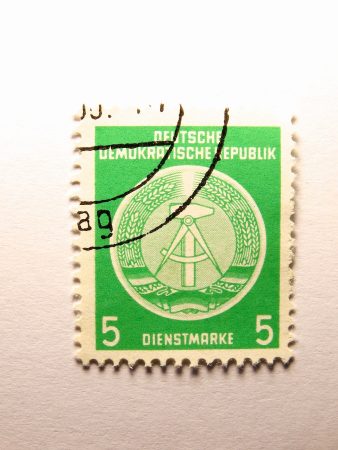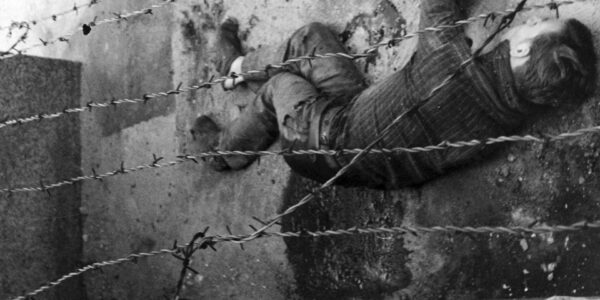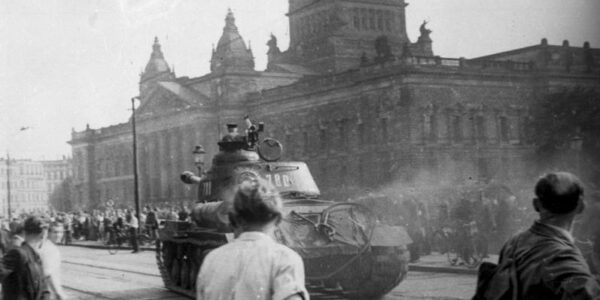By Patrick van Schie
October 7 is for many a date to remember the horrific attack by the terrorist organization Hamas on random civilians in Israel, who were murdered, raped, and/or kidnapped, with an estimated nearly 100 still being held hostage. In Europe, October 7 also holds a grim significance, albeit much further back in time. On October 7, 1949, the German Democratic Republic (GDR) was established, a satellite state of the Soviet Union that, like its mother state, was a communist dictatorship. The second word in its name was a lie from the outset. There was nothing democratic about the GDR. It was a “people’s democracy,” which is communist jargon for the absolute rule of the communist party (and its leadership) over the people. In the case of the GDR, even the leadership of the SED, the communist party of this satellite state, consisted of puppets of an even higher communist party elite: the Politburo in Moscow. The SED regime was installed by Moscow and was ultimately completely dependent on it.
This became evident within four years. Officially, the GDR was a “workers’ and peasants’ republic,” but embarrassingly, it was precisely the workers who rose in mass revolt within four years – in June 1953 – and the SED could only remain in power through the brutal force of Soviet tanks. [See: “June 17, 1953: workers against the so-called “workers’ state” GDR “.] Many citizens showed their preference for living in capitalist West Germany rather than in the communist GDR by “voting with their feet.” Every year, between 150,000 and over 300,000 residents left the eastern zone (the GDR) for West Germany via Berlin, which was still open at the time. On the night of August 12 to 13, 1961, the regime, after receiving approval from Moscow, put an end to this by building the Berlin Wall. Many victims would later fall at this wall, committing the “crime” (according to GDR law) of wanting to continue their lives in the free West. [See: “Refugee bleeding to death symbolizes the brutality of the Berlin Wall“.]
The construction of the Berlin Wall effectively turned the GDR into one large prison, where the population was spied on, kept down, and increasingly impoverished economically compared to the Germans lucky enough to live in the Federal Republic. Like in all communist countries, the party elite lived in luxury, literally in guarded enclaves and surrounded by goods from the West, while ordinary people stood in line for basic necessities, which were not always available. Housing and, for example, televisions were of poor quality; waiting for a Trabant (the GDR’s car) could take more than ten years.
Much worse, of course, was the loss of freedom and the constant surveillance. The Stasi, the secret police, had around 91,000 members in 1989, when the regime fell shortly after its 40th anniversary. Additionally, twice as many people worked as Inoffizielle Mitarbeiter (IM), informants. After the fall of the Wall, many East Germans discovered that even their own spouse belonged to these spies. In total, some 180,000 people were fully employed by the Stasi throughout the GDR’s history, and more than half a million worked as IMs. Every other citizen was a victim of this spying (see the film “The Lives of Others” from 2006). In total, around 165,000 people ended up as political prisoners in cells, in a prison within the large “open-air prison” that was the GDR. Anyone curious about what such a prison looked like can visit the former Stasi prison in Hohenschönhausen in the eastern part of Berlin. In the large building opposite the entrance, Stasi employees steamed open DDR citizens’ letters daily, checking for “suspicious” political ideas or escape plans before resealing them, so the letter would still reach the unsuspecting recipient.
35 years after the fall of the Berlin Wall and the collapse of the GDR’s communist dictatorship, the legacy is far from gone. Democratic sentiments in the Länder that once belonged to the GDR still lag far behind those in West Germany. Die Linke, which evolved from the SED, is shrinking, but the recent electoral successes of Bündnis Sarah Wagenknecht (BSW), led by a staunch pro-Russian communist, have more than offset this decline. In Brandenburg and Saxony, 1 in every 6 voters recently voted for one of these communist parties in the state elections, while in Thuringia, it was even 30%. The fact that most democratic parties in Germany do not outright exclude governing with BSW is naive to downright dangerous.
Image: https://pixabay.com/nl/photos/stempel-ddr-pfenning-postkantoor-607152/





Follow Us!